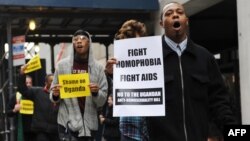KAMPALA —
Uganda’s speaker of parliament has promised a controversial anti-homosexuality bill will pass by the end of the year. A new coalition led by the former state minister for ethics says the country is prepared to deal with any international fallout.
The Coalition for Advancement of Moral Values does not officially launch until next week. But last Friday, the group of religious and civil society leaders organized a meeting with more than one-third of Uganda’s members of parliament. There they pushed for the reintroduction of a bill that would broaden rationalization of homosexuality.
Before the meeting ended, Rebecca Kadaga, the speaker of parliament, promised the bill would pass before the end of the year. James Nsaba Buturo, the former ethics minister and a coalition leader, says the measure’s widespread popularity will speed its approval.
“I can tell you it has 99 percent chance. It will pass. No question about it," Buturo said. "If there was any leader in this country who sympathizes with homosexuality, he will not say it in public. Because he knows that Ugandans, by and large, do not support that way of life.”
The bill was originally introduced in 2009. The initial version included the death penalty for some actions, like engaging in sexual activity with people under 18. Buturo says the death penalty language has now been stripped from the legislation and replaced with shorter prison sentences.
But the proposal has still drawn widespread international criticism. U.S. President Barack Obama calls it “odious” and some international donors threaten to cut off aid if the bill is signed into law.
Buturo says outsiders who criticize the bill are engaging in a “culture war” with Uganda. He says the bill’s re-introduction after being shelved by the last parliament shows his country will not be deterred by threats of aid cuts.
“We are saying to the world and to those who are supporting this way of life of theirs, ‘Come what may.’ They have no right whatsoever to impose their preference on this nation," he insists.
Clare Byarugaba, the co-coordinator of the Coalition on Human Rights and Constitutional Law says gay rights activists are pessimistic.
“The time that we have from now until Christmas, is a very short time for a bill to be tabled and then debated and then passed," Byarugaba says. "But, of course, there’s fear that it can actually happen.”
Because the bill’s proponents are framing the debate as a culture war between Ugandan and Western cultures, Byarugaba says her coalition is looking to activate local human rights groups to speak out in opposition.
“We call upon the international community not to speak out in the media about these issues. Whatever actions that are going to be done, should be done diplomatically, with the relevant stakeholders of this country," she says. "And, let the Ugandan community and the Ugandan human rights organizations and allies to do the groundwork.”
They are also preparing to raise constitutional challenges to the bill, if it does pass.
Parliament’s Legal and Parliament Affairs Committee is considering the bill before it can be tabled in front of the whole house.
The Coalition for Advancement of Moral Values does not officially launch until next week. But last Friday, the group of religious and civil society leaders organized a meeting with more than one-third of Uganda’s members of parliament. There they pushed for the reintroduction of a bill that would broaden rationalization of homosexuality.
Before the meeting ended, Rebecca Kadaga, the speaker of parliament, promised the bill would pass before the end of the year. James Nsaba Buturo, the former ethics minister and a coalition leader, says the measure’s widespread popularity will speed its approval.
“I can tell you it has 99 percent chance. It will pass. No question about it," Buturo said. "If there was any leader in this country who sympathizes with homosexuality, he will not say it in public. Because he knows that Ugandans, by and large, do not support that way of life.”
The bill was originally introduced in 2009. The initial version included the death penalty for some actions, like engaging in sexual activity with people under 18. Buturo says the death penalty language has now been stripped from the legislation and replaced with shorter prison sentences.
But the proposal has still drawn widespread international criticism. U.S. President Barack Obama calls it “odious” and some international donors threaten to cut off aid if the bill is signed into law.
Buturo says outsiders who criticize the bill are engaging in a “culture war” with Uganda. He says the bill’s re-introduction after being shelved by the last parliament shows his country will not be deterred by threats of aid cuts.
“We are saying to the world and to those who are supporting this way of life of theirs, ‘Come what may.’ They have no right whatsoever to impose their preference on this nation," he insists.
Clare Byarugaba, the co-coordinator of the Coalition on Human Rights and Constitutional Law says gay rights activists are pessimistic.
“The time that we have from now until Christmas, is a very short time for a bill to be tabled and then debated and then passed," Byarugaba says. "But, of course, there’s fear that it can actually happen.”
Because the bill’s proponents are framing the debate as a culture war between Ugandan and Western cultures, Byarugaba says her coalition is looking to activate local human rights groups to speak out in opposition.
“We call upon the international community not to speak out in the media about these issues. Whatever actions that are going to be done, should be done diplomatically, with the relevant stakeholders of this country," she says. "And, let the Ugandan community and the Ugandan human rights organizations and allies to do the groundwork.”
They are also preparing to raise constitutional challenges to the bill, if it does pass.
Parliament’s Legal and Parliament Affairs Committee is considering the bill before it can be tabled in front of the whole house.
